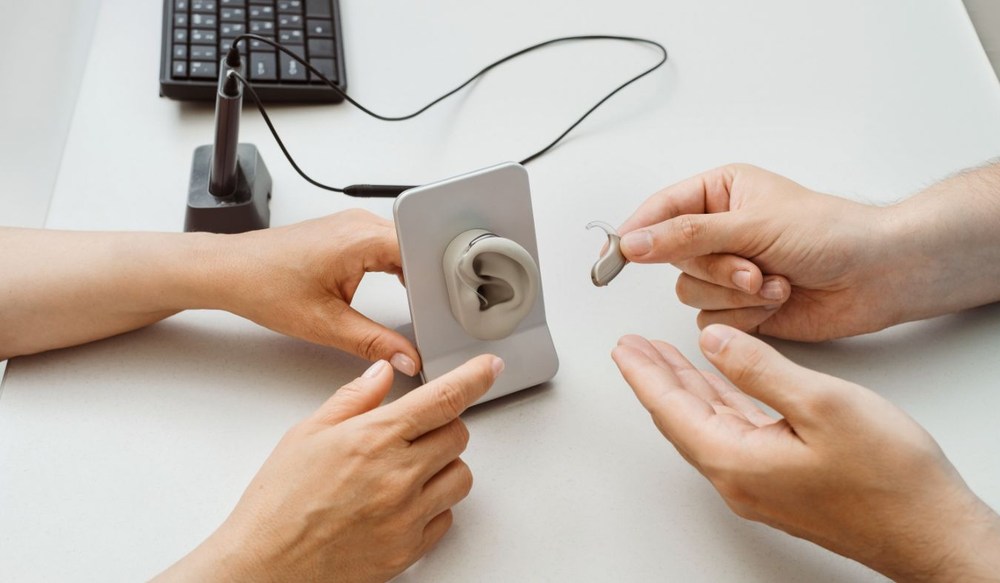Do I Need a Hearing Test? Screening Guidelines After 40
Most people don’t think about their hearing until they have to ask

By: admin | March 21, 2025
Winter brings special challenges when you rely on hearing aids. Just as cold weather affects your phone battery or car performance, it can also impact the devices you depend on to communicate with the world around you. When temperatures drop, your hearing aid batteries may lose power more quickly, potentially leaving you disconnected during important moments.
For many people with hearing loss, their hearing aids are essential tools they rely on throughout every hour of the day. When winter weather compromises battery life, it doesn’t just mean replacing batteries more often – it can mean missing parts of conversations, struggling to hear important announcements or feeling less confident in social situations.
Understanding how to preserve your hearing aid batteries during cold weather means you can stay connected to the people and sounds that matter, no matter what the thermometer reads. With a few simple strategies, you can help ensure your hearing aids keep working reliably even when winter is at its worst.
Understanding how your hearing aid batteries work is an important part of keeping your devices running smoothly. These tiny but powerful components turn chemical energy into electrical energy, which powers your hearing aids and lets you connect with the world around you.
Like all batteries, those in hearing aids have a limited lifespan. How long they last depends on several things like how often you use them and the temperature and humidity conditions they’re exposed to. Some hearing aids use disposable zinc-air batteries, which need to be replaced every few days to a couple of weeks, depending on the model and usage. Others rely on rechargeable lithium-ion batteries, which can last a full day on a single charge and be conveniently recharged overnight.
While the technical details of batteries might seem a bit complicated, learning about these crucial parts of your hearing aids is a key step toward making sure they work consistently, even during the chilliest winter months. Understanding whether disposable or rechargeable options fit your lifestyle best can also help you get the most out of your hearing technology.
Cold temperatures can affect both disposable and rechargeable hearing aid batteries, though in slightly different ways. Disposable zinc-air batteries rely on air to activate and cold weather can slow down this process, making them drain more quickly. Rechargeable batteries, on the other hand, can also struggle in low temperatures, as lithium-ion batteries tend to hold less charge when exposed to the cold. This means you may notice your hearing aids needing a recharge sooner than usual during winter months.
To help combat these effects, consider keeping spare disposable batteries in a warm, dry place and carrying extras with you when spending time outdoors. For rechargeable hearing aids, make sure they’re fully charged before heading out and avoid leaving them in cold cars or unheated areas for long periods. If your hearing aids have a portable charging case, using it while on the go can help keep them powered up throughout the day.
Being mindful of how cold weather affects your hearing aid batteries allows you to plan ahead and reduce disruptions. Whether you use disposable or rechargeable batteries, taking small precautions – like keeping your devices dry and storing batteries properly – can help maintain reliable performance even in chilly conditions.
Many people associate humidity with hot, summer months, but it can also be present in winter – just in a different way. Indoor heating systems can create very dry air, leading to low humidity levels that may cause disposable hearing aid batteries to dry out more quickly. On the other hand, moisture from snow, rain or even condensation from going between cold outdoor air and warm indoor spaces can introduce excess humidity, which may lead to battery corrosion or reduced performance.
For rechargeable batteries, fluctuating humidity levels can also affect how well they hold a charge. Too much moisture can interfere with the internal components of both the battery and the hearing aid itself, while overly dry conditions may contribute to static buildup that impacts performance.
To help keep your hearing aids working smoothly, consider storing them in a protective case when not in use, and if you’re in a particularly dry environment, using a hearing aid dehumidifier overnight can help remove excess moisture. Balancing humidity levels, whether through a humidifier in dry indoor spaces or extra care in damp conditions, can make a difference in keeping your hearing aids and their batteries running reliably.
Knowing the signs of battery drain during winter is an important part of managing your hearing aid performance. If you notice that your hearing aids aren’t working as well as they usually do, or if the battery life seems shorter than normal, it could be a sign of battery drain caused by cold weather.
One common sign is when you have to replace your batteries more often than usual. You might also find that your hearing aids aren’t as loud or clear as they should be, even when you’ve just replaced the batteries. These could all be signs that cold weather is affecting your batteries’ performance.
Understanding the effects of cold weather on your hearing aid batteries is one thing. Knowing how to store your hearing aids during winter is just as important. Proper storage can help keep battery life going and make sure that your devices keep working at their best.
A good tip is to keep your hearing aids in a dry and warm place when you’re not using them. Cold temperatures can affect battery performance, so avoid leaving them in cold areas or near windows where they might be exposed to frost. Also, remember that moisture is bad for these delicate devices! So, if you’ve been out in the snow or rain, make sure to dry off your hearing aids before storing them.
Another useful tip is to take the batteries out of your hearing aids if you’re not planning on using them for a while. This helps prevent unnecessary battery drain and extends the overall lifespan of both the device and its batteries.
Storing your hearing aids during winter doesn’t have to be a hassle! By following these simple tips, you can help make sure that they stay functional and ready-to-use all winter long.
Changing batteries in the cold might seem like a big task, but with the right methods, it can be pretty easy. Cold temperatures can make your hands feel numb, making it hard to handle small objects like hearing aid batteries. To avoid this problem, consider changing your batteries indoors where it’s warm.
Before you start replacing the battery, make sure you have a clean and flat surface to work on. This will keep the battery from rolling away and getting lost. Once you’ve taken the old battery out of your hearing aid, don’t rush to put in the new one. Instead, let it sit at room temperature for about five minutes before putting it in.
This short break lets air activate the zinc in the battery – a process that’s necessary for powering your hearing aids effectively. It also gives time for any potential cold from your fingertips to go away so that it doesn’t affect how well your new battery works.
Finally, when handling hearing aid batteries during winter months or any other time of year – always make sure that your hands are dry before touching them! Moisture can damage these tiny power sources and make them run out faster.
Protective cases aren’t just for keeping your hearing aids safe when they’re not in use. They can also help maintain the life of your batteries. Think of these cases as mini shelters for your hearing aids. They offer a controlled environment that can protect against extreme cold and dampness, both of which can negatively affect battery performance. By storing your hearing aids in their protective case when not in use, you’re giving them a much-needed break from harsh winter conditions.
Some cases even have built-in dehumidifiers to help manage moisture levels and prevent any damage to the batteries or the device itself. This is especially helpful if you’ve been out in snowy or rainy weather.
Using a protective case for your hearing aids is like giving them their own cozy winter coat! It’s an easy yet effective way to make sure that they keep working effectively all winter long while extending the life of their batteries.
There might come a time when, despite your best efforts, battery issues keep happening. This could show up as batteries running out faster than usual, even in warmer conditions, or your hearing aids not working at their best despite fresh batteries. In some cases, this might be due to a problem with how the battery sits in the compartment, corrosion on the contacts or even a malfunction within the hearing aid itself. If you’re noticing a consistent pattern of battery drain, it’s worth looking into what might be causing it rather than just replacing batteries more frequently.
Environmental factors could also be at play. If you’ve been in particularly humid or dry conditions, or if your hearing aids have been exposed to moisture, the batteries may not be performing as they should. For rechargeable users, if a full charge isn’t lasting as long as it used to, the internal battery may be degrading over time. Small changes – like storing batteries in a dry place, ensuring proper ventilation in the battery compartment or using a hearing aid dehumidifier – can sometimes make a difference.
If you’ve ruled out the usual suspects and the problem persists, it’s a good idea to have your hearing aids checked by an audiologist. They can assess whether the issue is with the battery, the device itself, or an external factor you might not have considered. Catching these issues early can help prevent more serious problems down the road and ensure your hearing aids continue working as they should.
Winter may bring extra challenges for hearing aid wearers, but with the right approach, you can keep your devices working reliably through the coldest months. By understanding how temperature, moisture and humidity affect battery performance, you can take steps to extend battery life and avoid unexpected disruptions.
Whether you use disposable or rechargeable batteries, knowing how to care for them in colder weather can help you stay connected and confident in any setting. If battery issues persist despite your efforts, a professional evaluation can help determine if there’s an underlying issue with your devices or power source. At Great Lakes Bay Hearing, we are always here to help make sure that you can keep enjoying life’s sounds no matter the season. You can contact us in Bay City or Midland, MI by calling (989) 941-0627 for more information.

Most people don’t think about their hearing until they have to ask
By: admin | January 19, 2026

Hearing aid design directly affects whether people actually use them. If a
By: admin | November 18, 2025

Many people expect hearing aids to provide clear hearing in every
By: admin | September 24, 2025
